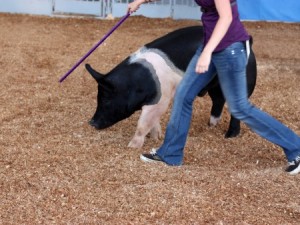Fair flu: It’s nothing to sneeze at

Visitors to hog barns should not drink or eat in hog barns and should wash their hands after leaving. Submitted photo.
COLUMBUS, Ohio – If pigs could say gesundheit, you could be hearing the German blessing as you visit fairs this summer.
Andrew Bowman, veterinarian with the Department of Veterinary Preventive Medicine at The Ohio State University, is in the midst of a seven-year study of 100 county fairs in Ohio, Indiana and Michigan, checking for incidences of Influenza A Virus Infecting Swine (IAV-S). On average, at least one animal at 25 percent of county fairs tests positive.
“It’s like kids at preschool. If one hog comes down with it, it’s going to spread,” Bowman said.
That’s likely what happened July 13 at the Clinton County Fair in Ohio, where Ohio Department of Agriculture officials discovered IAV-S and fair officials closed the Junior Fair Market Hog Show so that only exhibitors and their parents could attend. They also made the show terminal, meaning all hogs would go to slaughter. The hog barn will be sanitized.
IAV-S spreads from animals (not just swine) to humans, but is not considered any more dangerous than other flus, the Centers for Disease Control and Prevention (CDC) says.
The CDC and the National Association of Public Health Veterinarians offer the following information and tips on how fair exhibitors and visitors can stay healthy:
- IAV-S can pass from animal to animal or animal to human, and spreads like other flus – from sneezes or coughs that release droplets.
- While most people recover easily from this influenza, those under 5, over 65, pregnant or immune-compromised are most at risk. These people should avoid pigs and swine barns at fairs. Exhibitors or their family members who are at higher risk should also avoid exposure while they are at risk.
- Visitors to hog barns should not drink or eat in hog barns and should wash their hands after leaving. Keep the tiny ones out of the hog barns: strollers, pacifiers, bottles and toys should be left out of the barn.
- Exhibitors can minimize the chance of spreading the flu by keeping sick animals at home, by protecting themselves if their hogs are sick, and by disinfecting any tools or show supplies before a show. At home, sick hogs should be quarantined from healthy ones for at least seven days.
- At the show or fair, exhibitors should check their animals regularly for signs of flu – off feed, lethargic, sneezing, coughing.
- They should avoid sharing equipment with other exhibitors, but if they do, they should clean and disinfect it before using. If animals become sick at the fair, they need to be reported to the fair’s veterinarian or other fair staff. Besides not eating or drinking in the barn, exhibitors should not sleep in the barn.
- IAV-S does not affect meat safety or quality. People cannot get the flu by eating pork.









